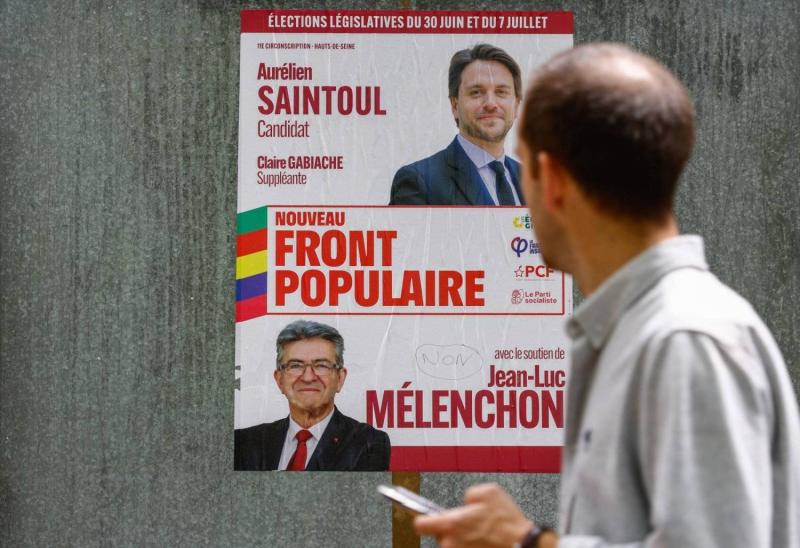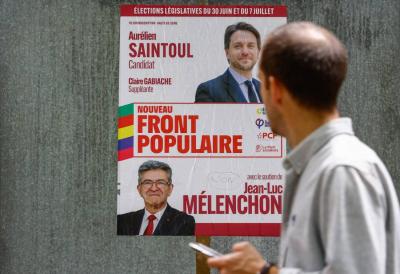The far-right in France has approached the opportunity to form a government more than ever since World War II, with the National Rally party, which is anti-immigrant, leading in opinion polls ahead of the first round of early parliamentary elections that began today, Sunday. President Emmanuel Macron dissolved parliament and called for early elections after the National Rally crushed Macron's centrist coalition (Together) in the European Parliament elections.
Macron will remain president after the parliamentary elections, the second round of which will be held on July 7, but he will have to select a prime minister from the party or coalition winning the most seats in the National Assembly, regardless of the policy differences. The following is an overview of some of the most important political figures in the elections:
**Jordan Bardella - National Rally (far-right party)**
Bardella, known for his elegance (28 years old), has Italian origins. He was raised by his mother in a low-income area in the northern suburbs of Paris but attended a semi-private Catholic school. He markets his working-class background as an asset. He told Le Monde: "I entered the world of politics because of everything I experienced there." Bardella joined the far-right party led by Marine Le Pen when he was 16 years old. Seven years later, Le Pen chose him as her party's candidate in the 2019 European elections. He was elected president of the party in November 2022. The seasoned Le Pen and her sharp young protégé, Bardella, have formed an impressive political team. Bardella used his TikTok account, which has 1.7 million followers, to attract younger voters. Together, they managed to expand the party's appeal beyond its historical strongholds along the Mediterranean coast and the so-called "Rust Belt" in the north by promoting the party as a defender of family income, jobs, and French identity. Bardella presents himself as a "potential prime minister focused on boosting purchasing power," promising a VAT reduction on energy and fuel, and income tax exemptions for those under 30. His opponents argue that he lacks professional experience due to entering politics at a young age and that his economic plans are unrealistic.
**Gabriele Attal from the "Together" Coalition (centrist)**
Gabriel Attal (35 years old) became the youngest prime minister in France's history after World War II when Macron appointed him in January. Attal, often referred to as "Little Macron," faces the daunting task of rescuing Macron's presidency and political movement. Angry voters across France are shifting their support to the far-right and a new left-wing alliance due to dissatisfaction with Macron's policies and personality, as the president is often viewed as arrogant and disconnected from daily struggles. Attal is also the first French prime minister to openly declare that he is gay. His star rose quickly during Macron's presidency. After joining the Socialist Party at 17, he became well-known on the political scene after being appointed government spokesperson during the COVID-19 pandemic. He served as budget minister and then spent several months heading the Ministry of Education before being appointed by Macron as prime minister in an attempt to distance himself from the far-right. One of Attal's first actions as Minister of Education in 2023 was to ban Muslim female students from wearing the "abaya" in public schools, which boosted his popularity among conservative voters despite his leftist affiliation.
**Left-Wing Figures**
There is no clear candidate for prime minister from the left, which has formed a broad coalition of parties known as the (New People's Front) in an attempt to unite against the National Rally. The alliance has not revealed its prime ministerial candidate. Here are some of its notable figures:
**Jean-Luc Mélenchon from France Unbowed**
Mélenchon (72 years old) has been a key player in the French left for decades and has held ministerial positions in previous governments while being a member of the Socialist Party. He ran for the presidency in 2012, 2017, and 2022, seeing an increase in his vote share each time. He finished third in the 2022 election after far-right leader Marine Le Pen, while Macron won that election. Known for his fiery rhetoric, Mélenchon is one of the most polarizing figures in French politics, igniting enthusiasm and fear among voters with his bold proposals on taxes, spending, class struggle, and his controversial positions on foreign policy, particularly regarding Gaza. Critics accuse him of antisemitism, which he denies.
**Raphaël Glucksmann from the Socialist Party**
Glucksmann (44 years old) is leading the Socialist Party's list of candidates in this month's European elections, where the party garnered around 14 percent of the vote, behind Macron's coalition (Together). This was seen as a sign of the party's revival after having ruled France for decades but recently falling into electoral oblivion. Glucksmann, whose father was a philosopher, received an elite education and worked in journalism and broadcasting before diversifying into various fields, including serving as a consultant to former Georgian President Mikheil Saakashvili. He calls for strong European support for Ukraine in its resistance to the Russian invasion.
**Laurent Berger, former Secretary General of a Trade Union**
Berger (55 years old) previously served as Secretary General of the moderate French trade union (CFDT). He has a strong track record of opposing the far-right National Rally. Berger stated that he does not want to become prime minister, but others on the left have proposed him as a consensual figure and a more popular alternative to Mélenchon.




